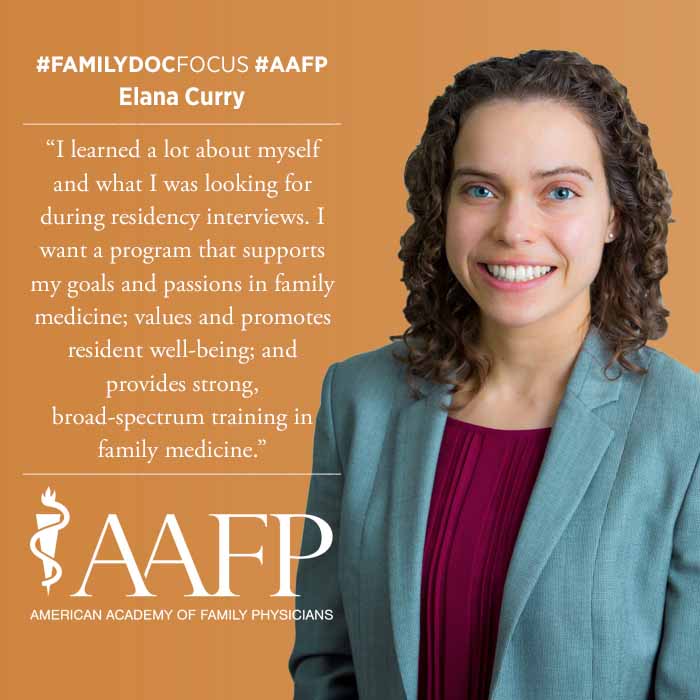March 16, 2020 08:57 am David Mitchell -- Elana Curry always knew she wanted to help people. On March 20, she'll be one of the thousands of medical students waiting to find out where they will take the next step in their training so that they can do just that.

"I can't wait to see where I match!" said Curry, a fourth-year student at the Ohio State University College of Medicine in Columbus who is participating in the National Resident Matching Program.
The value in assisting others was ingrained in Curry as a child. She grew up in a racially and socioeconomically diverse suburb of Cleveland where her father was the longtime director of a nonprofit agency providing affordable housing and related services.
"I was always exposed to the social determinants of health through the work he did," said Curry, whose mother is a psychologist. "We talked about the inequities that exist and how politics and policy affect people. There were a lot of discussions about that at our dinner table. I was really interested in issues regarding racial and socioeconomic disparities in health."
As an undergraduate at Ohio State, Curry co-founded ENCompass (Empowering Neighborhoods of Columbus) and also served as its co-president. The student group helps people in underserved communities by connecting them with health and social services resources, such as food pantries and electrical assistance programs.
"I loved the actual act of volunteering, being with people and hearing their stories," said Curry, who now serves as an adviser to the group. "Our health care system isn't always meeting people's needs, and people end up in emergency rooms or are admitted to hospitals for preventable diseases. Helping people is more than just giving them medicine and treatment. It's also understanding that people might not be able to access food or utilities and the greater impact that their community and life circumstances have on their health and well-being."
Curry initially intended to make an impact on public health as a researcher, but that field lacked the connection with people that she desired. A research project in Costa Rica after her sophomore year hammered home that point, and it also opened her eyes to another opportunity. During that trip, Curry spent a day working with patients at a community health fair.
"I left the happiest I had been the whole summer," she said. "I really enjoyed connecting with people. I realized that to have an impact, I wanted to work more directly with people, identify issues in their community and addressing them as a physician leader."
Curry, now planning a career path in medicine, shadowed family physician Allison Macerollo, M.D., who cares for patients in an underserved community in Columbus.
"I was thrilled to see the work Dr. Macerollo did as a family physician," Curry said. "I was inspired by the patient-centered, preventive, compassionate care she provided for her patients and could see myself pursuing a career in family medicine."
Near the end of her first year of medical school, Curry attended the AAFP's Family Medicine Advocacy Summit in Washington, D.C., putting her on a leadership path within the specialty.
"That was one of my favorite experiences in medical school," she said. "It was my first time being involved with the AAFP at the national level. I loved being with a diverse group of family physicians from all over Ohio and also from across the nation. It was a politically volatile time, and we had diverse political beliefs, but we all came together around issues that impact our patients. That was awesome."
That fall, Curry took on a bigger role as the AAFP's student representative to the AMA Medical Student Section. She is now a student member of the Academy's Commission on Federal and State Policy.
"I'm very interested in health policy," she said.
Curry said that her plan throughout medical school has been to match into family medicine, and her rotations during her third year confirmed that commitment. She's done her part to draw other students to the specialty. The Ohio State Family Medicine Interest Group was recognized as a Program of Excellence by the Academy when Curry was president in 2017.
The FMIG offered well-attended lectures, workshops and panels with family physicians working in diverse practice settings that highlighted the diversity of the specialty.
"Students don't always understand everything that family physicians can do," Curry said. "We wanted them to see the amazing opportunities family medicine offers."
Among her many honors, Curry was one of five students chosen from a field of 2,750 applicants to be awarded a Pisacano Scholarship last year by the ABFM. Now Curry, like her fourth-year peers, will spend this week waiting to hear where opportunity will take her next. Her interests include caring for underserved populations, community engagement, preventive health and women's health.
"I learned a lot about myself and what I was looking for during residency interviews," she said. "I want a program that supports my goals and passions in family medicine, values and promotes resident well-being, and provides strong, broad-spectrum training in family medicine."